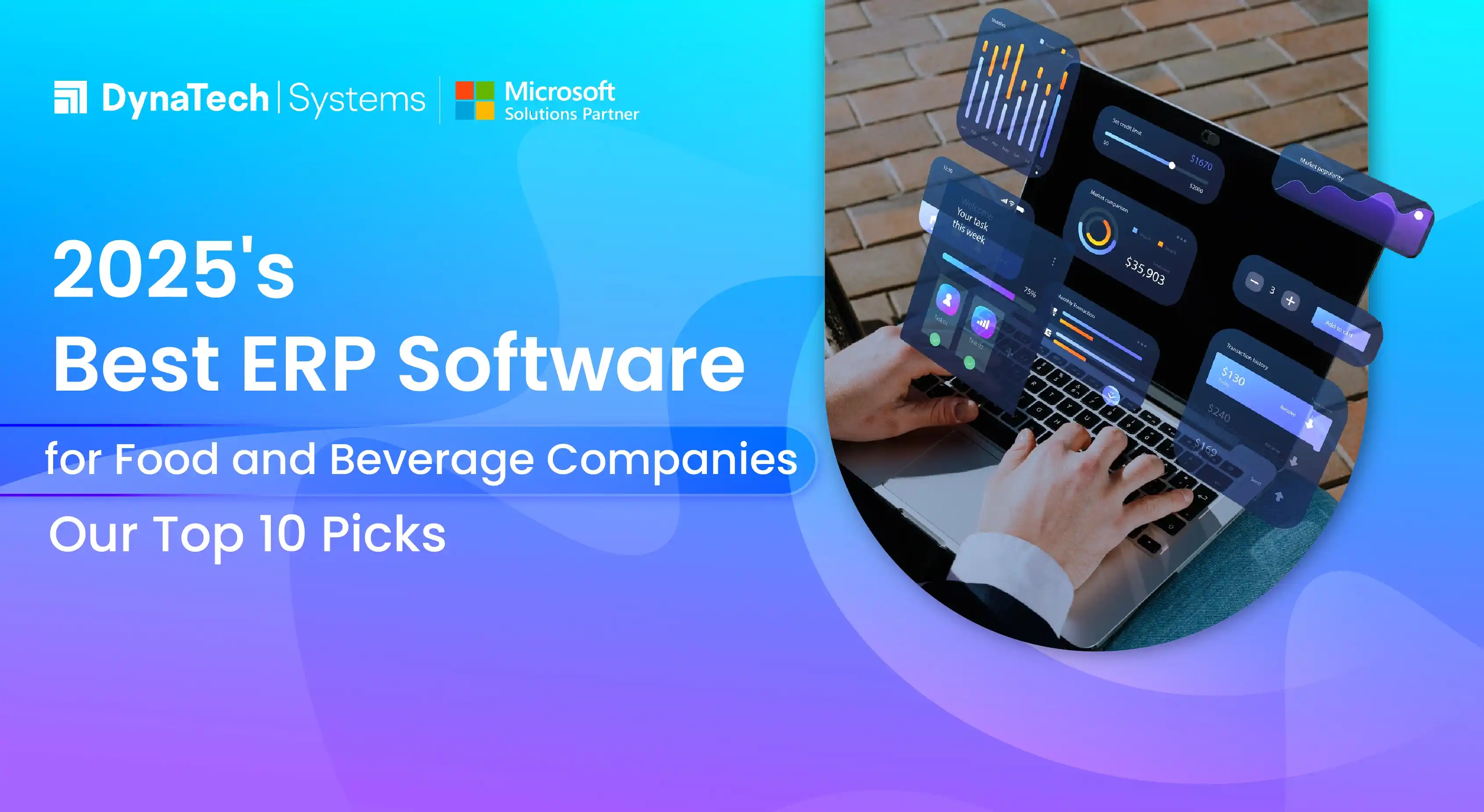In today's food and beverage market, execution is everything. It is no longer enough to craft a great product. Success hinges on how fast you can respond to ingredient shortages, how accurately you can trace a recalled lot back to its origin, and how efficiently you can predict the next seismic shift in consumer preferences.
Behind the scenes, the industry's frontrunners are not relying on spreadsheets or stitched-together legacy systems anymore. They are deploying highly specialized ERP ecosystems engineered to handle the brutal realities of perishable inventory, razor-thin margins, international compliance mandates, and the ruthless velocity of retail and distribution.
Choosing an ERP for food and beverage operations in 2025 is not a software purchase. It is a strategic infrastructure decision that touches every level of your business: product innovation, customer loyalty, brand protection, operational efficiency, and financial resilience.
In this guide, we cut through the noise to analyze the top food and beverage ERP platforms of 2025, based not on marketing promises, but on real-world performance metrics, implementation outcomes, and technical rigor. Whether you are a fast-scaling dairy brand or a century-old beverage manufacturer undergoing digital transformation, these systems are redefining what operational excellence looks like.
10 Leading Food and Beverage ERP Systems for 2025
1. Microsoft Dynamics 365 for Food and Beverage
Microsoft Dynamics 365 has firmly established itself as the command center for contemporary food enterprises, combining supply chain orchestration, intelligent financial management, and real-time production analytics into a centralized platform.
Key Advantages:
- AI-driven demand planning minimizes overproduction by up to 30 percent.
- The built-in lot and batch traceability meet rigorous FSMA and GFSI requirements.
- Hassle-free extensions through Power BI, Power Apps, and Microsoft Fabric for tailored innovation
Implementation Insight:
Businesses adopting Dynamics 365 in the food sector have reported inventory turnover improvements of up to 22 percent within the first year.
Pricing:
Entry point at $180 per user per month for core Finance and SCM. Advanced modules like Asset Management and IoT integrations may incur additional licensing.
Best Fit For:
Mid-sized to enterprise food manufacturers require flexibility, rigid compliance, and robust scalability for multi-site operations.
2. Aptean Food and Beverage ERP
Aptean brings food and beverage-specific DNA to ERP design, offering pre-built functionality that addresses allergens, expiration management, recipe formulation, and more without extensive customization.
Key Advantages:
- Expiration tracking and dynamic shelf-life calculation are built into inventory modules.
- Recipe development tools integrate seamlessly into production planning.
- Compliance-ready documentation for FDA, BRCGS, and SQF audits
Field Results:
Companies deploying Aptean solutions have consistently realized 25 percent faster order-to-shipment cycles.
Pricing:
Typical implementation costs range from $120,000 to $250,000 annually, depending on user base and module selection.
Best Fit For:
Mid-tier manufacturers and processors focused on traceability, allergen management, and fast deployment timelines.
3. JustFood ERP (by Aptean)
JustFood ERP was purpose-built for the complexity of food processing environments, offering tight control over quality processes, R&D cycles, and HACCP compliance frameworks.
Key Advantages:
- Native mobile interface for shop floor data capture and real-time inventory control
- Quality assurance features embedded throughout the production process
- Advanced product recall management that can trace ingredients back through multilevel supply chains
Real-World Outcomes:
Businesses implementing Just Food have shortened new product development timelines by an average of 38 percent.
Pricing:
Cloud deployments start at $95 per user per month. Enterprise editions vary based on feature scope and transaction volumes.
Best Fit For:
Large food manufacturers need granular traceability, quality-driven production, and extensive regulatory control.
4. Deacom ERP
Deacom sets itself apart with a unique monolithic ERP architecture — offering every module under a single codebase, eliminating costly integrations and patchwork systems.
Key Advantages:
- Complete traceability from raw material intake to final delivery without external add-ons
- Native direct-store-delivery (DSD) and route management for food distributors
- Automated batch production with embedded quality checks
Performance Gains:
Brands adopting Deacom have documented 40 percent reductions in batch production blunders post-implementation.
Pricing:
Annual subscriptions typically start at $150,000, with on-premise options available for heavily regulated sectors.
Best Fit For:
Large food processors or distributors looking for end-to-end control under a single software umbrella.
5. Infor CloudSuite Food and Beverage
Infor delivers a cloud-first ERP platform tailored to the realities of perishables manufacturing, including seasonality modeling, global lot traceability, and vendor risk management.
Key Advantages:
- Advanced catch-weight management for proteins and dairy sectors
- Out-of-the-box tools for MRP (Material Requirements Planning) specific to the food industry
- FSMA-ready traceability workflows across plants and distribution nodes
Operational Impact:
Manufacturers running Infor CloudSuite have reported 33 percent faster supplier quality audits and improved global sourcing agility.
Pricing:
Cloud-based pricing varies, typically starting around $3,000 per user annually, depending on deployment size.
Best Fit For:
Complex multinational food brands require sophisticated sourcing, lot control, and sustainability tracking.
6. SAP S/4HANA for Consumer Products (Food and Beverage)
SAP S/4HANA for Consumer Products brings one of the most powerful ERP backbones in the world to food and beverage enterprises, offering unmatched transactional performance and predictive supply chain capabilities.
Key Advantages:
- Real-time ingredient and allergen tracking across global manufacturing facilities
- Embedded AI for spoilage prediction and proactive inventory adjustments
- Compliance dashboards for global food safety mandates, including FSMA, EU 1169, and GSFI frameworks
Implementation Impact:
Organizations leveraging SAP S/4HANA have achieved 45 percent faster global recall capabilities compared to legacy ERP environments.
Pricing:
Subscription-based pricing typically starts at $3,200 per user annually, with extensive additional fees for specialized modules.
Best Fit For:
Enterprise manufacturers and multinational food brands require deep regulatory compliance, high-volume operations, and intelligent automation.
7. Sage X3 for Food and Beverage
Sage X3 offers a highly adaptable ERP suite designed for mid-sized and growing food and beverage manufacturers who need efficiency without enterprise-level complexity.
Key Advantages:
- Flexible BOM (Bill of Materials) and recipe management for batch and process manufacturing
- In-built allergen controls and shelf-life management
- Configurable workflows for HACCP, ISO 22000, and SQF compliance reporting
Field Results:
Food manufacturers utilizing Sage X3 report a 29 percent decrease in operational overhead costs within 18 months of adoption.
Pricing:
Deployment costs typically begin around $130,000 to $180,000 for cloud implementations, with user-based pricing thereafter.
Best Fit For:
Growing food processors seeking a balance between powerful compliance management and budget-conscious ERP investment.
8. Plex Smart Manufacturing Platform (Food and Beverage Edition)
Plex Systems delivers a true cloud-native ERP customized for manufacturers, offering a dedicated food and beverage edition that prioritizes real-time visibility, quality assurance, and agile production planning.
Key Advantages:
- Automated supplier and customer compliance validations
- Integrated SPC (Statistical Process Control) for quality monitoring
- Full traceability across multi-tiered supply chains via mobile-enabled lot monitoring
Operational Impact:
Companies running Plex have recorded an average of 35 percent improvement in production scheduling accuracy.
Pricing:
Annual cloud subscriptions start at around $2,400 per user, with minimum user thresholds for enterprise functionality.
Best Fit For:
Process-oriented food manufacturers need real-time production control, fast traceability, and scalable cloud operations.
9. Epicor Kinetic for Food and Beverage
Epicor Kinetic offers a modern, flexible ERP platform well-suited for food and beverage businesses navigating both discrete and process manufacturing demands.
Key Advantages:
- Native support for dual-unit measurement (weight and volume) critical for food formulation
- Quality control at each manufacturing stage with corrective action workflows
- Cloud-based analytics for predictive maintenance and equipment optimization
Implementation Results:
Businesses leveraging Epicor Kinetic have seen up to 20 percent reductions in unscheduled downtime and spoilage incidents.
Pricing:
Licensing typically starts at $1,800 per user annually, plus additional fees for advanced analytics modules.
Best Fit For:
Food manufacturers that require flexible batch processing capabilities along with integrated quality management and manufacturing intelligence.
10. BatchMaster ERP for Food and Beverage
BatchMaster ERP is purpose-engineered for formula-based manufacturers, offering a deep focus on batch processing, compliance, and recipe-driven production environments.
Key Advantages:
- Robust lot genealogy for full forward and backward traceability
- Automated compliance with USDA, FDA, and FSMA standards
- Integrated cost analysis tools for precise ingredient sourcing and pricing management
Real-World Outcomes:
Companies adopting BatchMaster ERP have reported reductions of up to 32 percent in product recall timeframes.
Pricing:
Annual cloud subscription typically begins at $1,500 per user, with flexible deployment models available for on-premise or hybrid needs.
Best Fit For:
Formula-driven manufacturers such as beverage, bakery, nutraceutical, and dairy producers demand fast lot tracing and stringent compliance.
Closing Thoughts: The Right ERP Is the Secret Ingredient to Growth
In food and beverage, success is never accidental. It is built on precision, quality, and smart decisions, and your choice of ERP is one of the most significant decisions you will ever make.
The platforms we explored above are reshaping how modern food businesses operate, helping brands move faster, stay compliant, and innovate fearlessly. But technology alone does not drive transformation. It is how you apply it that creates lasting success.
That is where DynaTech Systems comes in. We go beyond standard implementations. Our team tailors Microsoft Dynamics 365 ERP solutions to fit your unique manufacturing processes, regulatory requirements, and growth ambitions. Whether you are expanding a fast-growing brand or optimizing a multi-country operation, we bring the expertise to make sure your ERP investment delivers tangible, measurable outcomes.
If you are serious about scaling smarter, managing risks better, and building a future-ready food and beverage operation, now is the time to act.
Connect with DynaTech Systems today for a free consultation. Let us build the foundation for your next level of success.




























